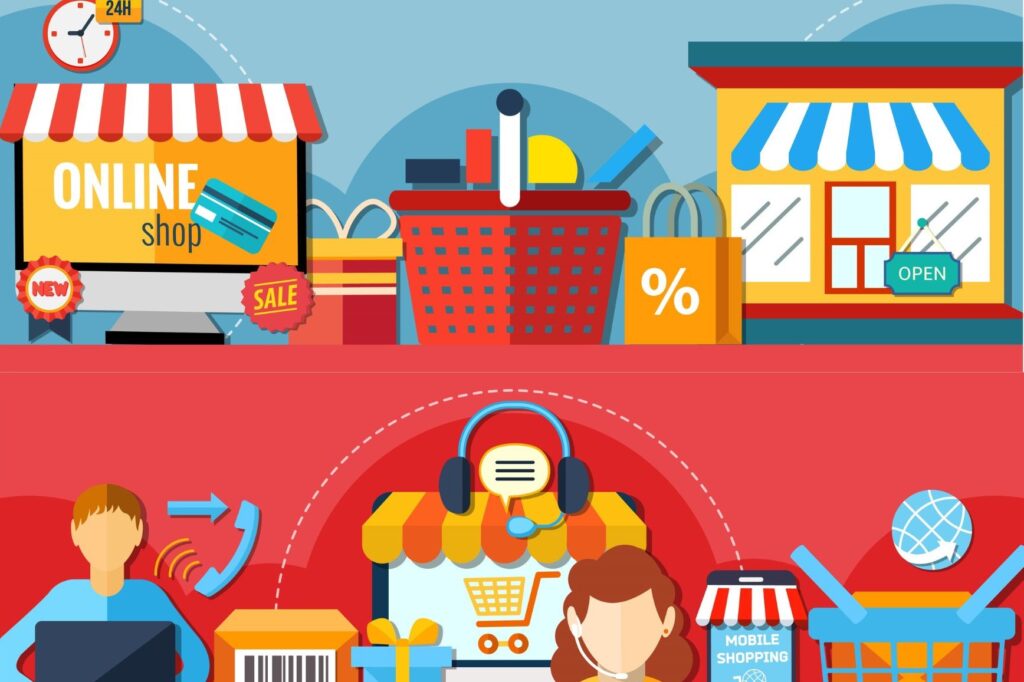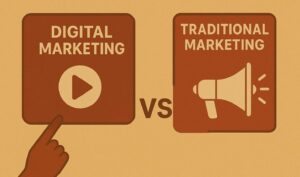We often hear terms like “e-commerce” and “e-business” used interchangeably, especially when talking about online business operations. While they may seem similar at first glance, e-commerce and e-business refer to two distinct aspects of doing business online. It’s essential to understand these differences, especially if you’re planning to start your own online business or enhance your current digital strategy.
In this article, we will explore the differences between e-commerce and e-business, explain how each term relates to modern business practices, and break down how they function in real-world scenarios.
By the end, you’ll have a clearer understanding of each concept and how they intertwine to shape the future of business operations.
What is E-Commerce?
At its core, e-commerce (electronic commerce) refers to the buying and selling of products and services over the Internet. It’s all about transactions that occur between buyers and sellers online. When we think about e-commerce, what often comes to mind are the online retail giants like Amazon, Flipkart, and eBay, but it also include digital goods such as software, e-books, music, or subscription-based services. Essentially, e-commerce covers any kind of exchange where products or services are traded for money through an online platform.
E-commerce involves a variety of activities related to the sale of goods and services. Some common examples of e-commerce include:
- Online product purchases and sales: Platforms where you can buy physical or digital goods, such as Amazon, Flipkart, and Etsy.
- Ticket sales: Online ticket booking for events, flights, or movies.
- Online payment systems: Websites or apps that facilitate monetary transactions, like PayPal, Stripe, or mobile payment options.
- Online customer service: Chatbots, helpdesks, or other customer support services that function on e-commerce platforms.
E-commerce has simplified and revolutionized how we shop by providing customers with convenient access to a vast range of products and services from the comfort of their homes.
What is E-Business?
E-business (electronic business), on the other hand, refers to a broader concept that encompasses all online activities necessary to run a business. It’s not limited to just transactions but rather includes everything from online communication and data management to internal processes and reporting. In other words, e-business is the integration of all parts of a business using internet-based tools, allowing companies to operate more efficiently and effectively in the digital world.
For instance, an e-business doesn’t just focus on selling goods and services online but also looks at how the business runs behind the scenes. This includes customer relationship management (CRM), supply chain management, data analytics, and enterprise resource planning (ERP). E-business might involve activities like managing inventory systems, collaborating with suppliers via online platforms, or communicating with customers through email marketing campaigns.
Here are some common examples of e-business:
- Online store setup: The entire process of setting up an e-commerce platform that includes managing products, payments, and logistics.
- Customer education: Websites that offer tutorials, webinars, or online guides to help customers understand the products or services offered.
- Supply chain management: Businesses using online tools to track inventory, manage suppliers, and optimize their logistics.
- B2B transactions: E-businesses may also focus on the business-to-business (B2B) market, where companies exchange goods, services, or data for operational purposes rather than just for direct sales to consumers.
- E-mail marketing and data analytics: E-businesses often use tools to collect customer data, analyze purchasing behavior, and send targeted marketing campaigns.
Relationship Between E-Commerce and E-Business For You
While both e-commerce and e-business are integral to modern businesses, they differ in their scope and objectives. E-commerce is a subset of e-business. It focuses specifically on the buying and selling of goods and services online, while e-business encompasses a much broader range of activities, including internal business operations, data management, and communication.
To put it simply:
- E-commerce: Primarily concerned with the transactions — the buying and selling of goods or services online.
- E-business: Involves all the online business operations, including marketing, data management, communication, and supply chain management.
Many businesses engage in both e-commerce and e-business. For example, an online retailer might sell products (e-commerce) but also manage inventory, communicate with suppliers, and track customer behavior using various online tools (e-business).
Key Differences Between E-Business and Consumer E-commerce
The most important distinction between e-commerce and e-business is the type of transaction being conducted. At its simplest level, business-to-consumer (B2C) e-commerce involves transactions between businesses and consumers, while business-to-business (B2B) involves transactions between businesses. Businesses engaged in B2C typically maintain a website from which customers can place orders. Whereas B2B websites are more likely to be used for collaboration, communication, and data management purposes rather than for product sales.
To further understand the differences, let’s break down some key distinctions between e-commerce and e-business:
| Key Distinction | E-Commerce | E-Business |
| Scope of Activity | Refers only to the transaction part of business — buying and selling products or services. | Encompasses a wider array of activities, including transaction management, customer service, marketing, supply chain management, and internal communication. |
| Business Models | Typically focused on business-to-consumer (B2C) transactions, though it can also involve business-to-business (B2B) or consumer-to-consumer (C2C) sales. | Can include all types of ecommerce business models, including B2B, B2C, C2C, and even business-to-government (B2G) transactions. |
| Purpose | The goal is to facilitate online buying and selling transactions. | The goal is to optimize the entire business process by using internet technologies to improve productivity, efficiency, and customer experience. |
| Technology Involved | Focuses on front-end technologies like websites, shopping carts, and payment gateways. | Involves both front-end technologies (like e-commerce websites) and back-end technologies such as customer relationship management (CRM) systems, enterprise resource planning (ERP) tools, and data analytics platforms. |
Understanding the Buyer’s Journey in E-Commerce vs. E-Business
Understanding the buyer’s journey is crucial for both e-commerce and e-business environments. However, the journey looks quite different for consumers and businesses.
- B2C (Business-to-Consumer): The typical B2C buyer’s journey is relatively short. A consumer might discover a product online, read reviews, compare prices, and make a purchase — all within a few hours or days. The focus here is often on immediate gratification, ease of purchase, and customer service.
- B2B (Business-to-Business): For businesses, the buying process is much longer and more complex. Before making a purchase, B2B buyers often go through a detailed research phase, which includes analyzing market trends, comparing competitors, negotiating terms, and reviewing contracts. E-business tools such as market analysis, customer relationship management (CRM), and data management platforms are crucial in this scenario.
Examples of E-Commerce and E-Business
To make the difference between e-commerce and e-business more clear, let’s look at real-world examples:
- Amazon: As one of the largest e-commerce platforms in the world, Amazon primarily focuses on B2C transactions, where consumers purchase products online. However, Amazon also utilizes e-business practices, like inventory management, data analysis, and logistics, to streamline its operations.
- Salesforce: Salesforce is an example of an e-business platform. While it doesn’t focus on directly selling products to consumers, it offers cloud-based software that helps businesses manage customer data, track sales, and improve their internal operations. Salesforce helps businesses optimize the process of selling and managing customer relationships, making it an essential part of the e-business ecosystem.
| Examples | E-Commerce | E-Business |
| Examples of Companies/Platforms | Online stores like Amazon, Flipkart, Myntra, and Paytm Mall, and sellers of digital goods like e-books. | E-commerce businesses and their various internal business operations, auction and classified websites, websites for software and hardware developers. |
| Key Activities | – Online product purchases and sales – Buying tickets online – Web-based payment – Paying various taxes – Online bookkeeping software – Online customer service | – Online store setup – Customer education – Buying and selling products – Monetary business transactions – Supply chain management – E-mail marketing |
Conclusion
So both the e-commerce and e-business are vital components of the digital economy, but they serve different purposes. E-commerce is focused on the buying and selling of goods and services online, while e-business is a broader concept that includes all online activities related to running a business, from internal operations and communication to customer relationship management and data analytics.
As a business owner or marketer, understanding the difference between these two can help you choose the right tools and strategies to optimize your business. Whether you’re engaging in e-commerce, e-business, or both, the key to success lies in leveraging the right technologies and strategies to meet your business objectives and satisfy your customers.
The future of business is undoubtedly digital, and by understanding and utilizing both e-commerce and e-business practices, you’ll be well on your way to building a successful online presence.






1 thought on “Difference between E-Commerce and E-Business: How it Varies?”
Hey, I read many of your blog posts that are really cool comparisons, very neatly narrated ones. Thanks for sharing.